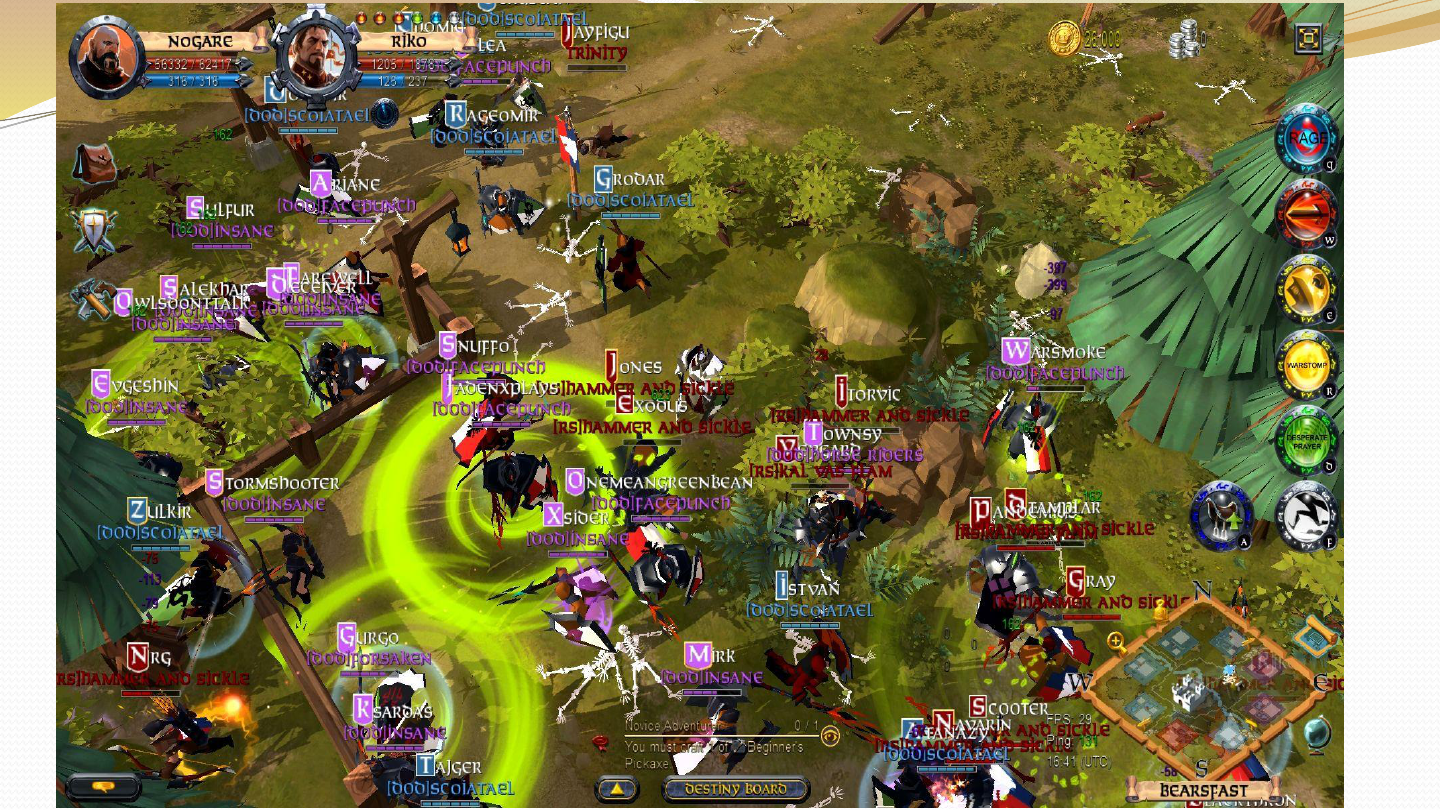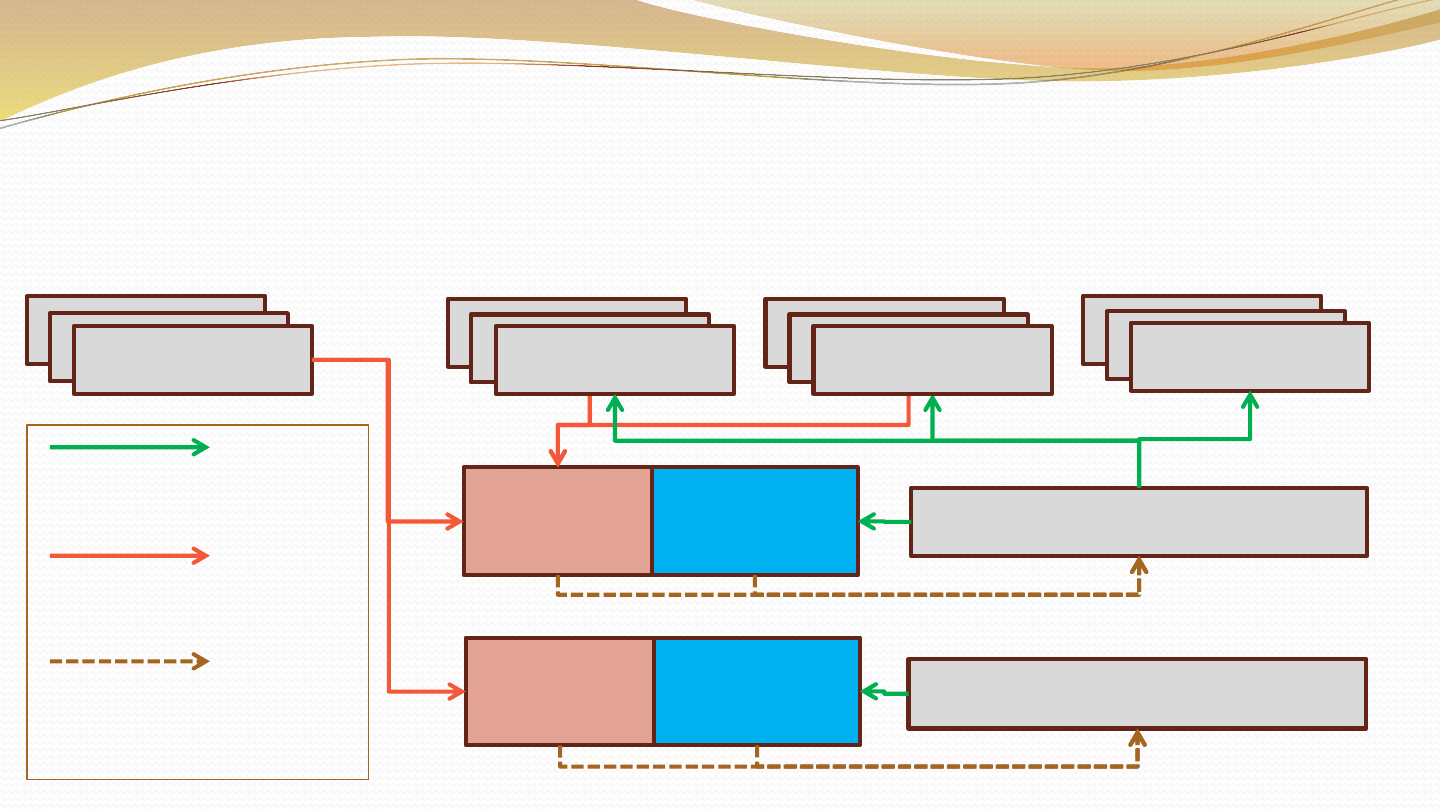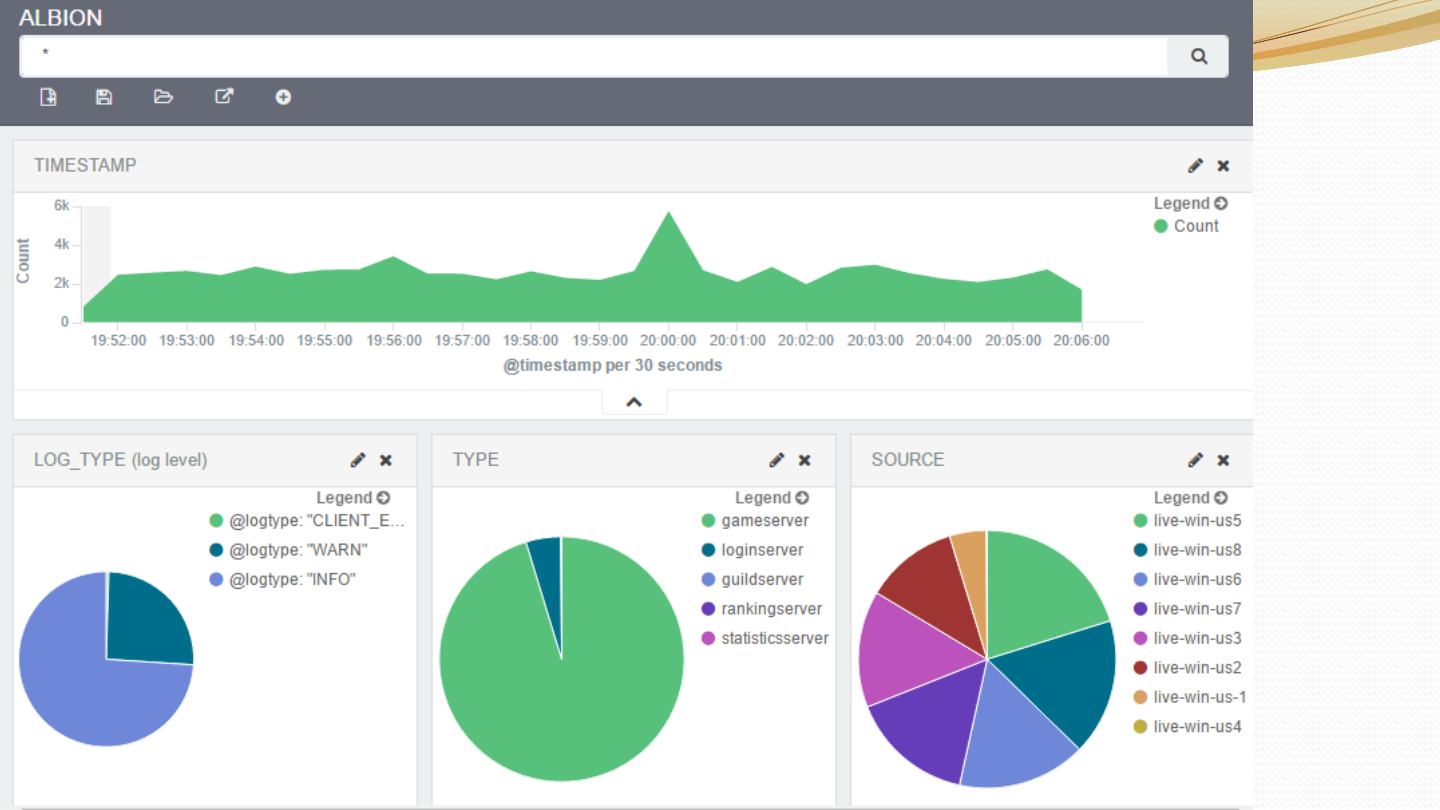
Software Architecture of an MMO
David Salz
david@sandbox-interactive.com

Who am I?
David Salz
15 years in the industry
CTO, Co-Founder of Sandbox Interactive
35 people
based in Berlin
we only do Albion Online!

In this talk:
What is Albion Online?
Middleware + Design Decisions
Server Architecture
How we use Unity (and how not)


Albion Online
Sandbox MMORPG
Cross-Platform (Windows/OSX/Linux/Android/iOS)
One World (no „Shards“ or „Servers“, not even for different platforms)
Player-Driven Economy (everything is player-crafted)
No Character Classes („you are what you wear“)
Strong focus on PvP + Guilds
Hardcore („Full Loot“ in PVP Areas)
Pay-to-play model
4 years in the making
Currently in Closed Beta w/ 80.000+ „founding“ players
„Release“ in Q4/2016

Albion Online
The initial pitch (2012)
Play-crafted equipment, buildings
One World (like EVE Online)
Guild vs. Guild Territotorial conquest
Top-Down perspective + Combat (like League of Legends)
Simple graphics, „can even be 2D“
PVP focus, no PVE, no Mobs, no Dungeons
Release in 2013

Middleware Selection
Engine Selection
Unity made sense – inexpensive, accessible
Cross-Platform was a „target of opportunity“
Database Selection
One world need a very scalable database, NoSQL
Cassandra sounded suitable
still use SQL for query-heavy problems
Networking Middleware
Photon!
can use C# on server (like in Unity!)
works with all Unity platforms

Apache Cassandra
NoSQL Database
Originally developed by Facebook
Open Source (Apache-License)
Java
Concept: everything is a hash table
in-memory (as much as possible)
optimized for high throughput
scales horizontally (just add servers)
redundant (no single point of failure)
CQL: SQL-like language (w/ massive restrictions – it‘s NoSQL)

Apache Cassandra
funny story from public Alpha Test…
all buildings disappeared during lunch break
found this in Cassandra Changelog:
W(
lesson learned: careful with cutting edge technology
* Fix possible loss of 2ndary index entries during
compaction (CASSANDRA-6517)

Apache Cassandra
Cassandra uses timestamps to resolve
conflicts between database nodes
also requires exact time sync beween servers
i.e. ntp service

Hosting
Hosted with Softlayer
good, but quite expensive
bare-metal machines only
currently: 8x 10-Core Intel Xeon, 32 GB RAM
Should be able to handle ~15k CCUs
Originally:
Hosted across 2 Datacenters (better ping for players)
Worked, but bad idea! (inter-server disconnects, latency)

Networking
Photon
UDP-based protocol (reliable/unreliable as needed)
TCP for chat, inter-server communication
use only basic message functionality (no Photon frameworks)
mostly simple messages, in rare cases JSON content
Had to implement secure TCP-reconnect abilities
Chat
Tried IRC…
… was only trouble (difficult to secure, customize)
Implemented own system in a couple of days

Consequences
Server needs to work without Unity
Ideally, client works without Unity, too!
think: tools, stress-test-bots!
Use Unity only as rendering front-end
cannot rely on Unity features for basic functions!
levels / game objects
collision
pathfinding

Separation
ObjectFactory ObjectViewFactory
Object
+Position
+…
+RequestAction()
ObjectView
+Renderer
+AnimationCtrl
+HandleInput()
destroyed
changed
…etc..
created
Object
+Position
+…
+RequestAction()
Server Client Unity-Client
Interest-Management
changed
…etc..
obj-enter
obj-leave

Server

Server Farm
Game Server
Game Server
Game Server
Login Server
World Server
Marketplace Server
GoldMarket Server
Statistics Server
Ranking Server
BackOffice Server
Chat Server
Client
Connect to different game
server depending on
location in game world
Game DB
(Cassandra)
Accounts DB
(Postgres)
Market DB
(Postgres)
GoldMarket DB
(Postgres)

Todo: screenshot of gold market

Todo: screenshot of marketplace

Game Servers / World Server
game world split into unique „clusters“ of ~ 1 km²
current world: ~600, next world: x2
distributed among game servers
player changes servers when travelling
handoff done through database (even on same server)
Instances are dynamically created
world server coordinates this
World Server
responsible for everything „global“
guilds, parties, coordination of guild battles etc.


Threading Model (Game Server)
IO Thread
IO Thread
Network IO
Thread
Event
Queue
Logging IO
Thread
Event
Scheduler
Cluster Thread
Event
Queue
Event
Scheduler
Cluster Thread
Pathfinding
Thread
Database IO
Thread
Cluster Thread makes
request
Events / Results get
put into Event Queue
Cluster polls Events
from Queue and
Scheduler

Threading Model
Game logic for one game area („cluster“) is single-threaded
Interactions between game objects too complicated otherwise; would
require lots of locking
Objects „sleep“ whenever possible (especially mobs)
All IO (Network, Database, Logging) and other „heavy lifting“
(pathfinding) offloaded to worker threads
Instances (Player islands, instanced dungeons) are combined in thread
pools
Other servers (chat, rankings) are completely multi-threaded

There is no spoon!
There is no game loop!
i.e. no Update() or Tick() functions for game objects
Gameplay thread processes events in order of arrival
Events are:
Network input, i.e. player commands
Timers (Event Scheduler)
If an object needs a tick (Mobs do), it creates a recurring timer
Results from DB queries (asynchronous)
Results from pathfinding
…

Interest Management
Players should only „see“ (network-wise) what‘s on their screen
important to reduce traffic…
… and prevent cheating!
Find objects a player can „see“ (and update when things move)
Objects send messages to all players that „see“ them
Needs to be efficient!
~500 mobs / cluster
> 10.000 interactive objects (mostly trees )
up to 300 players

Interest Management
grid based hash (10x10m cells)
● cells contain list of objects inside
● list is updated by object itself when moving
● cells fire events:
● ObjectEnteredCell()
● ObjectLeftCell()
player
● objects also fire events
● ObjectMoved()
● ObjectDestroyed()
● EventFired()

Interest Management
player
Interest area
Moves with player
Subscribe to objects when they
enter inner area
Unsubscribe when they leave
outer area
Tell player when:
● an object enters / leaves interest area
● an object in the area fires an event

Logging infrastructure
Game Server
Game Server
Game Server
Log File
Log File
Log File
Logstash
Agent
Redis
Elasic Search
Kibana
track errors, generate statistics
classic ELK stack (Elastic Search, Logstash, Kibana)
kind of unreliable for us
Also use Cassandra Counters a lot!
Logstash
Agent
Logstash
Agent
Own tools

Kibana

Kibana

Client

Level Design
Zones built in Unity (Unity scenes)
Consist only of Unity prefabs („tiles“)
~ 30.000 / level
Collision is painted for each tile
Level gets exported to XML format
level loading independed from Unity (for server, client)
in Unity: instantiate prefabs
actually faster and more controllable!

Level consists of
„tiles“ (Unity prefabs)
Tile has 3d collider
(for mouse picking +
ground height
definition)
2d collision is painted
per tile
(blocks movement /
blocks shots / blocks
placement etc.)
Ground tile
Object (non-ground) tile

Collision
TODO: pictures, demo
Collision of all tiles
is blended together

Unity Features we (don‘t) use…
Do:
Editor: cool and customizable (but often too slow)
Sound: yes, but want to switch to Wwise or FMOD
Mechanim: now, after a long struggle (memory usage!)
Not or very limited:
Scenes – only to load GUIs (but not levels)
Collision/Physics – only raycasts @ ground
GUI – use modified NGUI instead
Network – use Photon instead
Baked light – scenes way too large

Unity troubles
funny story…
64 bit editor came just in time for us
32bit editor was no longer able to build our project
used > 2.7 GB RAM during build with is the max for
win32 processes
headless was still working!

Character rendering
Character + Equipment gets baked into one mesh
want 1 draw call / character (well, + special effects)
real-time
parts of character mesh hidden depending on equipment
Only one material for character + all equipment items
Only one texture; also use vertex colors, specular
Limit number of characters drawn (esp. on mobile)


Todo: characters picture

Debugging
Can run and debug complete environment locally on developers
machine
Human-readable network log file
Server and client errors caught in log files
Searchable, with context
Public staging system
Community can preview patches, updates
QA freelancers from the community
Frequently mirror live database to public staging system
Can download live database to developer machines

TODO: screenshot of network log file

Cheaters
people started using memory debuggers and packet sniffers
pretty much on day 1
Absolute server authority is king!
Includes what information you reveal to client!
only one serious cheat ever found
mistake on our side –“believed“ data from client without proper
check
Gold Sellers / Account Stealing
adding email verification greatly improved this

Cheaters
.NET code very accessible for analysis
camera hacks (minior problem because of interest management)
found internal tools , cheats in code (not working on live)
extracted data from client
maps, player rankings
cool community projects!
Users built bots directly into client
Difficult to prevent
Obfuscation – helps, but not much
We are doing more integrity checks now!
Future: Unity IL2CPP ?


Future Challenges
Growing player base…
Want a more diverse world
exploring more modular level design right now
Keeping iOS / Android version in sync with server
ability to download data files without patching
clients support old server / server supports old clients

Thank you!
Questions / Comments?
david@sandbox-interactive.com
We are hiring!
https://albiononline.com/en/jobs
